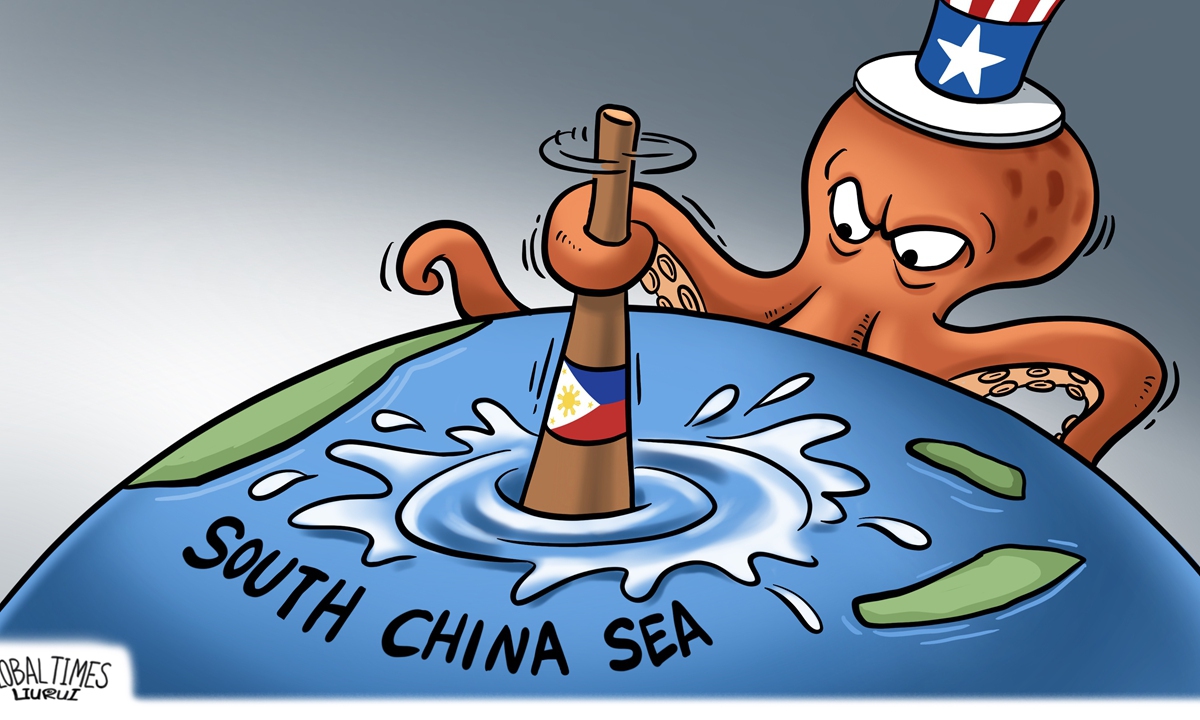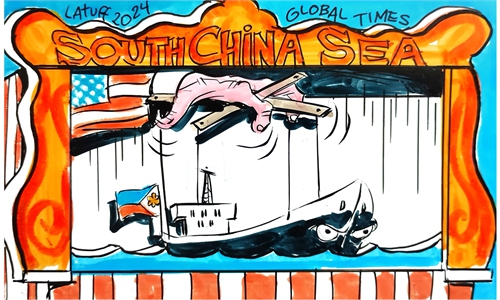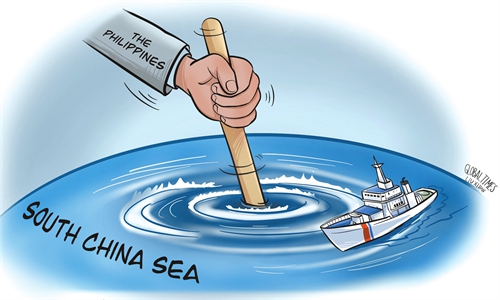
Illustration:Liu Rui/GT
On Saturday, the Philippine Coast Guard (PCG) vessel MRRV-9701, which has been illegally anchored in the lagoon of China's Xianbin Jiao (also known as Xianbin Reef) for a long time, provoked troubles in an unprofessional and dangerous way and intentionally rammed into the Chinese Coast Guard (CCG) ship 5205, which was lawfully implementing control measures. As a result, a collision happened between the two vessels.
However, the Philippines shifted the blame to the CCG ship, accusing the latter of "dangerous maneuver." The US Department of State immediately issued a statement to accuse the CCG vessel of "deliberately colliding" with the PCG ship and put the labels of the "dangerous and escalatory actions" onto China.
China has indisputable sovereignty over the Nansha Qundao (Nansha Islands) and its adjacent waters, including Xianbin Jiao. The CCG vessel's law enforcement is in accordance with the law and regulations. It is the US and the Philippines that stirred troubles and dangerously escalated the situation.
There is also something worth mentioning in Saturday's collision: when the CCG ship took control measures against the Philippine vessel, a US Navy P-8A maritime patrol aircraft was spotted on-site, disrupting the CCG's law enforcement operations. However, most US media did not mention a word about it.
Washington should also be very clear that the appearance of a non-regional country's military aircraft in the scene of maritime friction comes with the suspicion of leading to a greater conflict or even fanning the flame.
A few days ago, the Commander of US Indo-Pacific Command, Admiral Samuel Paparo, publicly declared that it was "an entirely reasonable option" for the US to send its ships to escort Philippine vessels on supply missions in the South China Sea. This has aroused concern that the US military might be directly involved in the dispute between China and the Philippines. The presence of the P-8A, regardless of its purpose, has released a wrong signal of provoking confrontation and added fuel to Manila's dangerous "shows" in the South China Sea.
Since entering the lagoon of Xianbin Jiao without China's permission in April this year, the PCG ship has assumed the task of imitating the Philippines' BRP Sierra Madre, which has been grounded illegally at China's Ren'ai Jiao for a long time. But in fact, under the control of the CCG in accordance with the law, the PCG vessel has seen increasingly limited space to make any move.
PCG spokesperson Jay Tarriela admitted on Tuesday that the ship's supplies were seriously insufficient and had reached a "critical level." Seeing that it is difficult to "replicate" the goal of "deliberate grounding," the PCG vessel 9701 began a new round of shows in Xianbin Jiao, which is nothing more than putting all the energy into making a scene and sadfishing, trying to make a public opinion sensation and gain sympathy by pretending to be a "victim."
Betting on the safety of its own crew and the risk of military conflict, Manila constantly staged a self-inflicted provocative farce on the stage of the South China Sea, fantasizing about making "quantitative change" to achieve the breakthroughs of "qualitative change."
This is a complete miscalculation. The CCG has the right, responsibility and ability to take measures to resolutely thwart all infringing acts of provocation and nuisance. Possible actions include cutting off Manila's supplies to PCG ship 9701, preventing Philippine ships from entering the lagoon, and having high-powered tugboats ready to tow away the ship at any time.
On Friday, China's Ministry of Natural Resources released an investigative report on the coral reef ecosystem in Xianbin Jiao, confirming that the ship that has been anchoring at Xianbin Jiao for a long time causes continuous damage to the reef. China has never lacked humanitarian goodwill toward the Philippines' normal activities in the South China Sea, but will never turn a blind eye to Philippine ship's destructive behaviors, including the continuous damage to the South China Sea ecosystem.
Now the US and the Philippines are using each other in the South China Sea issue. For the US, no matter how beautiful the words are, the positioning of the Philippines as a "pawn" has never changed. Manila is also very clear that it has limited bargaining chips with the US, and the more extreme it goes in the South China Sea issue, the smaller its space it has in negotiating with the US.
The reason why the Philippines released information to the outside world claiming to be discussing "expanding the scope of interpretation of 'armed attack' in the US-Philippines Mutual Defense Treaty" is because Manila hopes that Washington can make some concrete commitments. However, for Manila, the most important thing is to face reality and give up illusions. Manila should not underestimate the cost of challenging China, nor should it assume that everything will be covered by the US.
The bilateral consultation mechanism on the South China Sea issue has been held nine times, with the most recent meeting taking place exactly two months ago. The commitments made by both sides to promote a de-escalation of tensions in the South China Sea are still fresh. Until Manila fundamentally changes its mind-set of using the South China Sea issue for geopolitical speculation, China is fully prepared both psychologically and in action for any possible backtracking or provocation by the Philippines. If the Philippines attempts to move forward one step, China will firmly push it back. China will not allow the Philippines to gain any advantage. The only choice for Manila is to withdraw its ship and personnel at Xianbin Jiao.
During the just concluded visit of US National Security Advisor Jake Sullivan, China has made it very clear on the South China Sea issue: the US must not use bilateral treaties as an excuse to undermine China's sovereignty and territorial integrity, and must not support or condone any infringement by the Philippines. This is a warning to the US, but also a piece of friendly advice. To truly listen to and understand China's words, and to meet China halfway, is what the US must do to avoid "the situation that neither China nor the US wants to see," as mentioned in US media reports.


